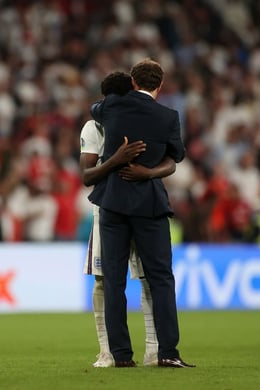On Sunday 31 million people tuned in to watch Gareth Southgate’s England team take on Italy in the Euro 2020 final at Wembley Stadium. Whilst we might not have ended up with the result we wanted, in reaching the final of the UEFA European Championship, they achieved something that no English men’s team has ever done, and they finally broke what has been described as a ‘curse’, ending decades of hurt following what has been for many, a lifetime of successive England failures at major tournaments.
| Download our FREE Leadership guide here |
Gareth’s types of leadership styles and approach has led to him being widely applauded with former national team-mate Gary Neville describing him as “everything a leader should be”. However, when he was first given the England job in 2016 as caretaker manager, he was far from a popular choice with many calling for a more experienced manager to take over full-time. Since then, he has actively sought out those who could help him to learn and develop his own skills to help him to achieve a high performing England team.
“I like listening to people who know things that I don't, that's how you learn."
Research shows that as much of 75% of leadership is learned, with practise needed to develop and hone those skills, and Southgate has recognised and embraced this need for continual learning.
“If you are not constantly improving and learning, then you are going to be stuck and not progress.”
As business leaders, what can we learn from Gareth Southgate’s leadership style?
1. CharacterStudies consistently show that the number one trait required for effective leadership is integrity (i.e. ‘do as you say, say as you do’) and Southgate epitomises this with his professionalism, honesty and humility. His inner strength is also self-evident - you don’t bounce back from being publicly scapegoated (following his missed penalty in Euro ’96) without considerable strength of character.
“Sometimes you have to go through difficult times as a team, and failures, to learn and to improve."
He has the confidence of his players and has instilled a sense of pride in them, encouraging them to recognise their roles and responsibilities as role models who need to conduct themselves appropriately, both on and off the pitch and who have the ability to “inspire and unite” and “create memories that last forever”.
2. CareSouthgate has described that his coaching approach is to “have empathy with people”.
“As a coach, you always have to be there to support the person - improving them as a player becomes secondary to a degree. But if a player feels that you respect them and you want to help them, then they are more likely to listen to you and follow you.”
This care and empathy leadership have been evident on many occasions during his tenure as England manager from putting his arm around 19 year old Bukayo Saka after he missed his penalty in the final to the personal messages he has written for many of England’s young fans.

(Image via Getty Images 2021)
When the national media widely called for Harry Kane to be replaced after his drop in form in the group stages, Southgate confirmed that Kane would be starting in the next match, calling him England’s “most important player”. Southgate was himself no stranger to public criticism and his compassion and support for his captain in response to the negative onslaught reflected his empathetic approach to leadership.
And we all know how Kane rewarded his manager’s support as he went on to score four goals at Euro 2020 putting him level with Gary Lineker as England's joint highest scorer at major tournaments.
3. Courage
Leadership is about doing what is right, deciding the best course of action to take and having the courage to lead with principles.
The England team have been taking the knee before the start of every game during Euro 2020 to highlight racial inequality and discrimination, which had led to booing from fans and opposition from some quarters. In an open letter to the country entitled Dear England, Gareth Southgate showed the self-belief and courage of his convictions and explained why he would continue to support his players’ decision to take the knee:
“I have a responsibility to the wider community to use my voice, and so do the players. It’s their duty to continue to interact with the public on matters such as equality, inclusivity and racial injustice, while using the power of their voices to help put debates on the table, raise awareness and educate.”
4. ConvictionGreat leaders are great decision makers and they need to have conviction in those decisions, even when they may be difficult and conflicting perspectives / viewpoints have to be balanced. Demonstrating strength, whilst acknowledging the challenges and staying focused on the end goal, leaders can inspire trust and confidence in those around them.
Throughout Euro 2020 Southgate has faced criticism for his decisions, from his failure to use Grealish more, his persistence in starting Sterling and his continued support for Kane. During major tournaments, fans everywhere become expert pundits with every decision scrutinised, but Southgate has remained confident in his decision making, prioritising the needs of the team over individual players as shown by his decision to take Grealish off after only 36 minutes on the pitch and replace him with Kieran Trippier.
5. ComposureEngland managers invariably face huge pressures from national media and football fans across the country but throughout Euro 2020 Southgate has appeared calm, sincere and thoughtful in his interactions with the media. He doesn’t try to avoid difficult questions but deals with challenging issues head on and focuses on what can be learnt and how they can move forward. Even in the high-pressured environment of a major tournament when shouldering the collective expectations of a nation, Southgate has not only maintained his composure but has encouraged it in his players as highlighted by their response to going 1-0 down against Denmark in the semi final and the focus they were able to maintain, dominating the game after a nervy start until the final whistle 120 minutes later.
John Stones has praised his manager for the calmness that he brought to the England camp:
“Gareth has created an incredible culture within our team. There is an incredible unity and calmness which is his unique quality as a person and a manager…One of his best characteristics is his composure under pressure, his will to win, and it shows. When you have a leader, a manager who has this quality, it happens very quickly in the team and you get on board quickly. It’s special to have.”
6. Competence
Over the last few weeks, Southgate has consistently shown his leadership ability, building teams by bringing together a squad of players of differing ages, experience and approach into a strong, focused and united team. This England team inspires a sense of pride that previous teams have never achieved and that is testament to Southgate’s guiding hand.

(Image via England Football 2021)
Back in 1996 Baddiel and Skinner sang of “30 years of hurt (that) never stopped me dreaming” and in helping England to get to their first major tournament final in 55 years, Southgate helped dreams to come true. A leader who truly does #InspireBelief.
Our next leadership program for senior leaders (LEAD™) starts in November. If you would like to learn more about effective leadership, please click here. You can also book a call with one of the QuoLux™ team to talk through how we may be able to help you.
The QuoLux™ Blog brings leading insights to business leaders and managers, with models, tools and techniques that stimulate thinking and provide practical, actionable and valuable approaches. Topics include leadership, management, strategy, leading change, leading teams, employee engagement, Good Dividends and many more. Make it easy for yourself and subscribe to ensure you receive FREE articles like these.




